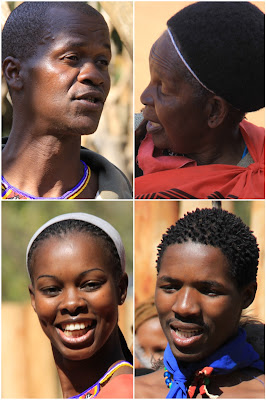Swaziland was not on our list of destinations when we planned this world trip. But it was in our way, right smack in the middle of South Africa, so we drove through it, spending one night there. As you will see from the photos, it was not at all unappreciated. The landscape, with its red iron-rich sand, seem dry dusty and barren but it is a beautiful landscape teeming with life.
We visited a traditional Swazi village and learnt about their way of life. Let me tell you about it my way:
A long time ago, a little
Swazi boy
called Masocha
about to turn 6
got ready to move into his
own hut.
For Swazi children
both boys and girls
left their parents’ huts
when they turn 6
to sleep in little huts of
their own.
Girls near the entrance of
the compound
to announce the arrival
of guests
or warn of the attack
of enemies.
Boys had their huts a little
further away
at the beck of their father’s
call.
In the compound
the medicine man
has his hut
surrounded by medicinal
plants.
Some we recognize
like the aloe vera
others, native to Africa
we have no names for.
There is a meeting area
where only men and boys
come in the evenings
to talk, discuss, chat,
laugh.
Girls and women
can only come at the edge
to bring food.
Kneeling down
to show their respect
and their submission
for that is the way it is
Masocha is the eldest son
He, together with his
youngest brother
will stay on to take over
their father’s role
and the middle siblings may
leave
to set up home anywhere they please.
Masocha, whose name mean
soldier
will have to learn to hunt, to farm
and to accumulate some wealth
to be able to provide for a
wife.
One who is considered ready
to marry at 18
He can have as many wives as
he can afford
his wealth indicated
by the number of cows he
owns.
The girl he marries then becomes
a woman.
No ring she wears
but instead goat skin
to indicate she is now a married woman.
If any of his wives practices
witchcraft
or dares to cheat on him
he sends her back to her
village
and there negotiates back his
cows
given to her family in
marriage
subtracting one cow for every
son
two for every daughter
that she has borne him.
Masocha’s mother is first
wife.
She has a hut to sleep in
and another to cook in when
the weather brings rain.
Second wife has a hut nearer
to father
also one to cook in
and the outdoor kitchen
shared with first wife.
If he marries another, then her
hut is nearest to him.
When Masocha is naughty or
neglects his chores
then father thrashes him with
a stick
and mother pulls his ear.
He runs to grandmothers hut
seeking refuge
for in this hut he is safe you see.
The greatest respect is
shown to grandmother.
Just the same, father and
other men of the village
go to her hut to seek her
wise advice.
In Swazi culture
the elder has the final say.
On the eve of Masocha’s
wedding
If he is to go away
he spends the evening before there
gathering blessings to take with him on his journey.
When he returns from his long
voyage
this is his first stop
where grandmother is ready
to welcome him and update him
on the events in his absence.
has committed a crime
he is tried by the men of the
village.
He may lose a limb
or a life
if a life he has taken.
Then if the trial finds him
guilty
he is to climb the Execution
Rock
and there
prodded by his fellow village
men
he is made to jump.
Never is there a survivor
known.
Masocha knows that
when he turns 6
he is old enough
to move into his own hut
but he will forever be
considered a boy
until the day he takes a
wife.
And so though he lies in
anticipation
of turning 6
he is really dreaming
of becoming a man
that day he takes a wife.
And oh what a day of celebration that will be!
But until then
in the Kingdom of Swaziland
we are in no hurry.














No comments:
Post a Comment